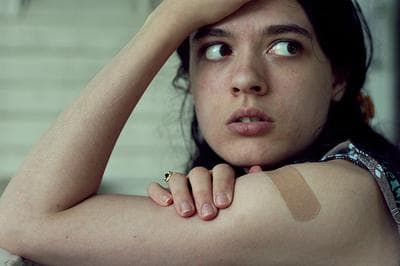Advertisement
Insights On Why Some Girls Are Skirting The HPV Vaccine
Public health officials have been somewhat puzzled by low rates of HPV vaccination: only 54% of adolescent girls receive the first dose of the 3-part vaccine series, and only 33% complete it.
What gives? Doctors recommend it. It’s safe and effective. It has the potential to save thousands of lives every year. So why aren’t more people getting the HPV vaccine?

A new study by doctors and public health researchers at the University of Colorado sheds light on who remains unvaccinated and why. (While the full article has not yet been released, the authors recently presented their research with an abstract and poster.) It builds on previous findings that deserve mention: women of low socioeconomic status have the highest risk of developing cervical cancer because of their limited access to other preventative measures, like annual exams and pap smears. In other words, poor women need the HPV vaccine the most. But among the girls who begin the vaccine series, minorities and the impoverished are much less likely to complete it.
To find out why, the researchers, led by Sean O’Leary, MD, MPH, interviewed the parents of girls with an incomplete HPV vaccination. They recruited both English-speaking and Spanish-speaking parents for the study to see if there were any major differences in reasoning or access to care.
As it turns out, two big issues appear to be at play here: parents don’t understand the importance of completing the vaccine series, and healthcare providers aren’t following up about scheduling doses 2 and 3. Spanish-speaking parents had particular trouble with the latter; one parent reported that their provider was “not clear on when to get the next [shot in the series],” even though they wanted their daughter to complete the series “because we are responsible.”
What we’re looking at, it seems, is a bit of a break-down in doctor-patient communication.
First, apparently parents need to be better-informed about how the vaccine works, and why all 3 doses are necessary. Second, healthcare providers need to practice better outreach and to ensure that adolescents who start the series complete it. Logistically, in a household already struggling to make ends meet, taking the time to make and keep 3 healthcare appointments for a single child could seem burdensome and unnecessary. Several parents said that text reminders from their provider could help them keep track of the vaccine schedule.
Then there is the issue of many girls not receiving the vaccine at all. Given that 84% of unvaccinated girls had gone to the doctor for other routine vaccinations in 2012, the researchers had a hunch that parental concerns about the HPV vaccine in particular could be at play here. They interviewed parents of children who had not started the vaccine series, and here again two major issues bubbled to the surface: among these parents, there is very little understanding of what the HPV vaccine does and even what HPV is, and they are wary that protecting their daughters against an STI might encourage early sexual activity. Both English- and Spanish-speaking parents cited this concern, although sexual abstinence was especially prioritized among Spanish-speaking parents.
What these parents apparently fail to realize is that HPV can lead to serious health complications and that it is extremely common, with 75% of the US population contracting the virus at some point. So even if their daughters remain abstinent until marriage (an expectation some of the parents in this group hold dear), there is a very real chance they could still be exposed to HPV.
The study concluded:
"Among English-speakers...vaccine safety concerns, a low perceived risk of HPV infection, and distrust of government and/or medicine were the primary barriers to vaccination. Surprisingly, some parents of [girls who had Not Completed the vaccine series] also reported that safety concerns emerged only after their daughter had received the first dose. Only Spanish speaking [parents of girls who had Not Initiated the vaccine series] cited spiritual influences as common barriers to vaccination, especially concerns that vaccination would encourage sexual activity and undermine their expectations of abstinence until marriage. Both Spanish-speaking groups also frequently reported that providers had either not encouraged initiating the HPV vaccine series (NI) or had not explained the necessity of completing the series (NC)."
These results highlight the need for more dialogue between healthcare providers and parents about the benefits and risks (hint – there are virtually none) of administering the HPV vaccine to adolescent girls. Because of the slight differences in reasoning between English-speaking and Spanish-speaking parents, the researchers suggest catering vaccination efforts to different populations.
While we’re at it, let’s not forget that adolescent boys can benefit from the vaccine series, too. And ultimately, the more people who are protected, the less successful the virus will be at spreading; this is called herd immunity and it’s helped protect us against many other horrible (but preventable) diseases.
This program aired on October 15, 2013. The audio for this program is not available.